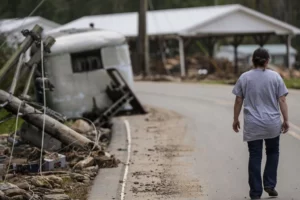
Election officials in North Carolina and Georgia, two states hit by Hurricane Helene, say the November presidential election will not be affected by the storm’s damage.
Officials say they are working on plans to ensure every ballot is cast and counted by Nov. 5.
In a Monday news conference, Georgia officials eased concerns about the state of voting this year.
“What has been on everyone’s mind is what will happen to elections,” Georgia Secretary of State Brad Raffensperger said Monday in Atlanta. “Good news: Absentee ballots are going out this week as scheduled, and early voting will start next Tuesday, on Oct. 15.”

“We’ve seen so many instances of county election officials and registrars that have been working weekends, working nights to ensure that everything stays on schedule with the election calendar,” Georgia Elections Director Blake Evans said. “We’re very, very thankful for them and for that.”
Despite Georgia experiencing widespread power outages from Hurricane Helene, Raffensperger said the voting offices and machines escaped significant damage. With 2,400 polling locations across the state, so far, only three need to be assessed due to damage.
Also on Monday, the North Carolina Board of Elections unanimously approved a measure that would give the 13 hardest-hit counties’ local election officials more authority. It would allow them to access emergency supplies, alter or change voting locations, and deploy absentee voting at disaster shelters ahead of early voting, beginning on Oct. 17.
“We are committed to ensuring that we open early voting on the 17th in all 100 counties, including these affected counties,” said Karen Brinson Bell, executive director of the North Carolina Board of Elections. “It may look a little different in these affected counties, but we fully intend to offer early voting starting on the 17th.”
Last week, 14 North Carolina voting centers were closed, but as of Monday, every county elections office opened, allowing for officials to assess damages. Two election stations were severely damaged by flooding, and the Board of Elections cleared the election officials to bring in National Guard tents or Federal Emergency Management Agency trailers for polling locations.
Many of the state’s 11 polling locations were within schools and fire departments, which are still being used as shelters. It was reported that 67,000 people in the state do not have electricity and many do not have running water.
The hurricane’s damage sparked concerns over the voting access of rural areas of the southeastern states, which are heavily populated with GOP and independent voters. Voters in Asheville, North Carolina, and surrounding Buncombe County could be harmed the most by the storm.
“I’m here to reassure our community that Buncombe County will vote,” Corinne Duncan, the director of Buncombe County Election Services, said at a news conference Monday.
CLICK HERE TO READ MORE FROM THE WASHINGTON EXAMINER
In Buncombe County specifically, most offices and voting equipment were spared, but the lack of water and power are still seen as challenges. Regardless, early voting is still scheduled in the county, and residents can register to vote until Friday.
“We are assessing what voting locations are available,” Duncan said. “We must respect the gravity of our situation.”







